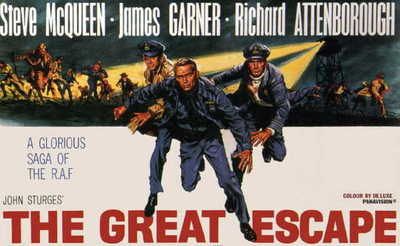
The Great Escape
1963
Director: John Sturges
Starring: Steve McQueen, David Attenborough, Charles Bronson, James Garner, James Coburn, Donald Pleasence, and lots and lots of other men.
When you think “Nazi POW film,” you don’t really think of a light-hearted romp. And yet, while I would refrain from calling The Great Escape a comedy, there is a levity to it that is both refreshing and wildly unexpected. That is one of the biggest reasons I love this film.
Sick of dealing with repeated escape attempts at other prisons, the Germans, rather unwisely, round up all the major POW escape artists and put them all in the same camp. Lead by their appointed commander “Big X,” (Attenborough) a grand plan to attempt to move 250 prisoners out of the camp at once begins to form. The film follows the construction of three separate escape tunnels, the escape itself (not really a spoiler, the title of the film gives that away), and the fates of the escaped POWs.
This is a war film unlike so many other war films. For one thing, we know the backstory of almost none of the characters. Steve McQueen’s Hilts mentions that he went to college for chemical engineering (a big woot from the chemistry teacher for that one!) and joined up after that, but that’s about it. We are not subjected to long winded speeches of “Before the war, I blah blah blah, and now that I’m here, I have to escape to get back to blah blah bloobity blah.” These men are not motivated by their desire to return to previous lives, but rather, by the simple need to escape. They cannot and will not accept being penned against their will. As their commander says, they will try to escape because it will tie up German resources fighting them, thus diverting the forces from the Allied Front.
Well, if the film doesn’t focus on the personal stories of the extremely large cast of characters, what DOES it focus on? Quite simply, this movie is all about the escape. This movie is terrifically interested in the logistics of the escape; that is the true star. And it’s fascinating. Watching the prisoners first determine the locations of the tunnels, to the issue of removing the dirt, to solving the problem of supplying fresh air into the tunnels, to shoring up the walls of the tunnel. The messaging system between the prisoners is vast. Prisoners use “art time” to work on forgeries instead. It’s one gigantic scheme involving every single person in the camp. It reminded me of watching a great heist film, and I love heist films.
The first two thirds of the film have a very different tone from the last third, marking the shift from the preparation for the escape to the fortunes of those who made it out. The beginning of the film, while not a comedy, is mostly lighthearted; an impromptu Fourth of July celebration is a highlight. Watching Steve McQueen march out of solitary confinement and then immediately attempt to escape again, only to be marched right back into solitary, is actually funny. I know it doesn’t sound funny, but the film maintains an upbeat attitude for this portion. However, it brilliantly turns into an incredibly taut suspense adventure film for the final third of the film when we witness the escape and watch the escapees flee through occupied Germany. I had seen this film before, and yet I still found myself at the edge of my seat, shouting at my TV.
I have to mention the music. I am keenly interested in music in film, and for my money, Elmer Bernstein’s theme is one of the top five ever written. It’s catchy, it’s fun, and it’s so much a reason why the film manages to maintain a thoroughly entertaining attitude, despite being a war POW film. Furthermore, it is also wholly original. The score to The Great Escape is quite unique; no other film sounds like this one, and that’s rare. This is not a generic movie score. I love it for that.
The acting, funnily enough, is the weakest part of the film. The film suffers from rather stodgy performances, especially in the few death scenes, and thus manages to be at odds with itself. From the narrative perspective, the film feels fresh and exciting; from the performance perspective, it feels old and dated. Even Steve McQueen’s delivery of a few key lines is a bit unintentionally funny. However, the film is so strong in terms of narrative structure and so much more focused on plot than character development that it can easily overcome this.
I would never list “war films” as one of my favorite genres. I tend to be hypersensitive to violence, something which recent war films have far too much of for me to deal with. However, just like any genre I generally dislike, there are several exceptions of films that I love. I thoroughly enjoy The Great Escape. It’s a long film that doesn’t feel long, an old film that feels fresh, and a great cinematic romp. This is good stuff; really good stuff.
Arbitrary Rating: 9/10
No comments:
Post a Comment